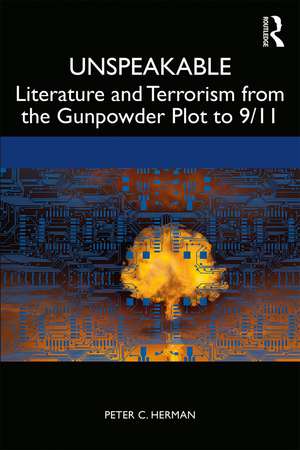Unspeakable: Literature and Terrorism from the Gunpowder Plot to 9/11
Autor Peter C. Hermanen Limba Engleză Paperback – 25 sep 2019
| Toate formatele și edițiile | Preț | Express |
|---|---|---|
| Paperback (1) | 373.43 lei 6-8 săpt. | |
| Taylor & Francis – 25 sep 2019 | 373.43 lei 6-8 săpt. | |
| Hardback (1) | 1000.27 lei 6-8 săpt. | |
| Taylor & Francis – 30 sep 2019 | 1000.27 lei 6-8 săpt. |
Preț: 373.43 lei
Nou
Puncte Express: 560
Preț estimativ în valută:
71.46€ • 74.79$ • 59.47£
71.46€ • 74.79$ • 59.47£
Carte tipărită la comandă
Livrare economică 31 martie-14 aprilie
Preluare comenzi: 021 569.72.76
Specificații
ISBN-13: 9780367249007
ISBN-10: 0367249006
Pagini: 224
Ilustrații: 3 Line drawings, black and white; 32 Halftones, black and white; 35 Illustrations, black and white
Dimensiuni: 152 x 229 x 13 mm
Greutate: 0.08 kg
Ediția:1
Editura: Taylor & Francis
Colecția Routledge
Locul publicării:Oxford, United Kingdom
ISBN-10: 0367249006
Pagini: 224
Ilustrații: 3 Line drawings, black and white; 32 Halftones, black and white; 35 Illustrations, black and white
Dimensiuni: 152 x 229 x 13 mm
Greutate: 0.08 kg
Ediția:1
Editura: Taylor & Francis
Colecția Routledge
Locul publicării:Oxford, United Kingdom
Public țintă
Postgraduate and UndergraduateCuprins
Introduction: Speakable/Unspeakable: The Rhetoric of Terrorism 1. "A Deed without a Name": Macbeth, the Gunpowder Plot, and Terrorism 2. Terrorism and the Nineteenth Century: From the French Revolution to the Stevensons, Greer, James, Conrad, and the Rosetti Sisters 3. When Terrorism Becomes Speakable: Pontecorvo's The Battle of Algiers and the Literature of the Troubles 4. Israel/Palestine: Unspeakability in John le Carré, The Little Drummer Girl, Steven Spielberg, Munich, and Mohammed Moulessehoul [Yasmina Khadra], The Attack 5. "Why do they hate us?": Updike, Hamid, DeLillo 6. Epilogue: Where Do We Go From Here? Nadeem Aslam, Amy Waldman, and Jodi Picoult
Notă biografică
Peter C. Herman is Professor of English and Comparative Literature at San Diego State University.
Recenzii
Peter Herman’s expansive study causes us to question and reconsider what we think we know about terrorism and about those who engage in such acts. The range of the text − from the Gunpowder Plot to 9/11 – highlights the paradoxical impulses (to speak and not to speak) at the heart of any narrative about terrorism. -- Tim Gauthier, University of Nevada, Las Vegas
This is a must-read book for anybody interested in the cultural interpretation of terrorism. By zooming in on the speakability/unspeakability paradox, characteristic of acts of terrorism, Peter Herman succeeds in revealing how literature and film create a counter-narrative that undoes simplistic ideological interpretations of political violence. His readings demonstrate how the possible worlds of fiction and film create a triangulating discourse that runs counter to the reductive us-versus-them rhetoric, current in journalistic and political interpretations of terrorist events. -- Kristiaan Versluys, Ghent University, Belgium
Peter Herman’s book is a fine demonstration of what the humanities might provide to the study of terrorism, usually left to social sciences...Historians and literary and film scholars, in particular, will find the book a welcome addition, but one might hope that terror experts in the social sciences will read it for a new perspective from the humanities for understanding terrorist events in their human complexity. --Ann Larabee, Modern Philology
For Herman writers of fiction ‘have always offered us the tools for a better understanding of terrorism. We just need to pay attention.’ This scholarly, insightful, and illuminating book gives these writers their due attention, and it also shows how the one-dimensional representations it critiques have too often obscured our historical understanding of terrorism, and too often left us dangerously blind in one eye. -- Matthew Carr, Infernal Machine
This is a must-read book for anybody interested in the cultural interpretation of terrorism. By zooming in on the speakability/unspeakability paradox, characteristic of acts of terrorism, Peter Herman succeeds in revealing how literature and film create a counter-narrative that undoes simplistic ideological interpretations of political violence. His readings demonstrate how the possible worlds of fiction and film create a triangulating discourse that runs counter to the reductive us-versus-them rhetoric, current in journalistic and political interpretations of terrorist events. -- Kristiaan Versluys, Ghent University, Belgium
Peter Herman’s book is a fine demonstration of what the humanities might provide to the study of terrorism, usually left to social sciences...Historians and literary and film scholars, in particular, will find the book a welcome addition, but one might hope that terror experts in the social sciences will read it for a new perspective from the humanities for understanding terrorist events in their human complexity. --Ann Larabee, Modern Philology
For Herman writers of fiction ‘have always offered us the tools for a better understanding of terrorism. We just need to pay attention.’ This scholarly, insightful, and illuminating book gives these writers their due attention, and it also shows how the one-dimensional representations it critiques have too often obscured our historical understanding of terrorism, and too often left us dangerously blind in one eye. -- Matthew Carr, Infernal Machine
Descriere
This book explores the representation of terrorism in plays, novels and films across the centuries, arguing that writers and filmmakers including William Shakespeare, Joseph Conrad, and Steven Spielberg confront the unspeakable by attempting to examining the roots of terrorist violence.
